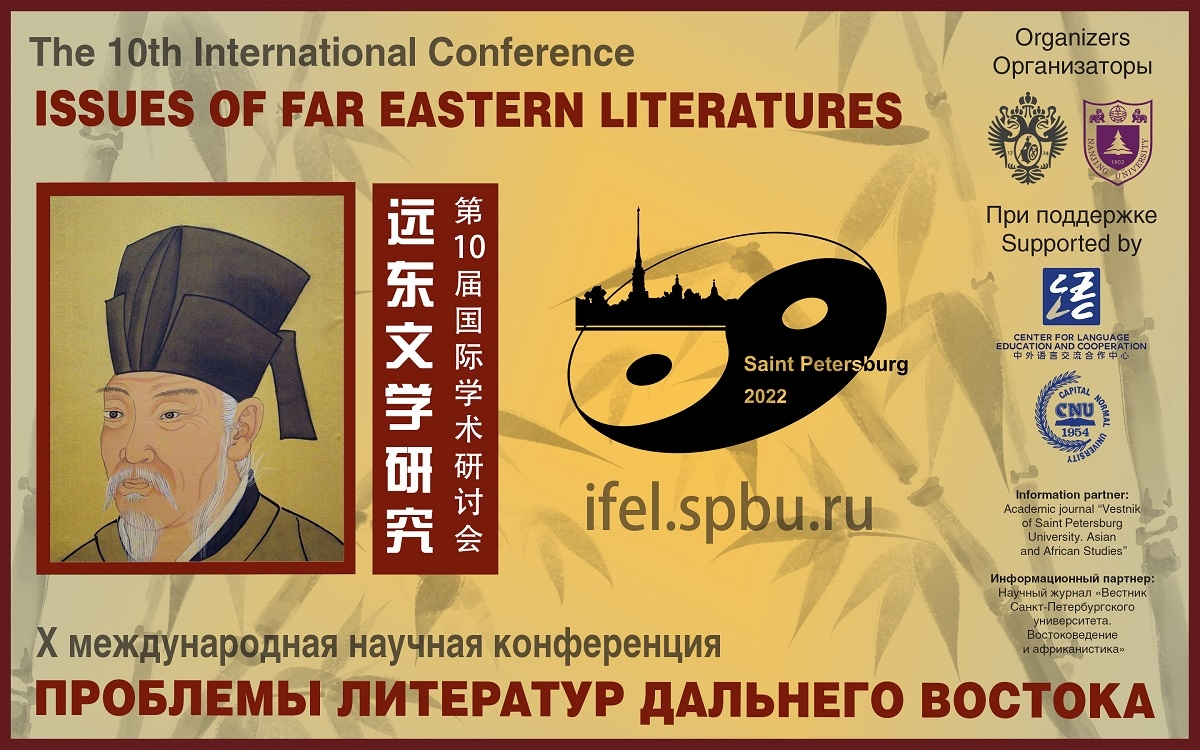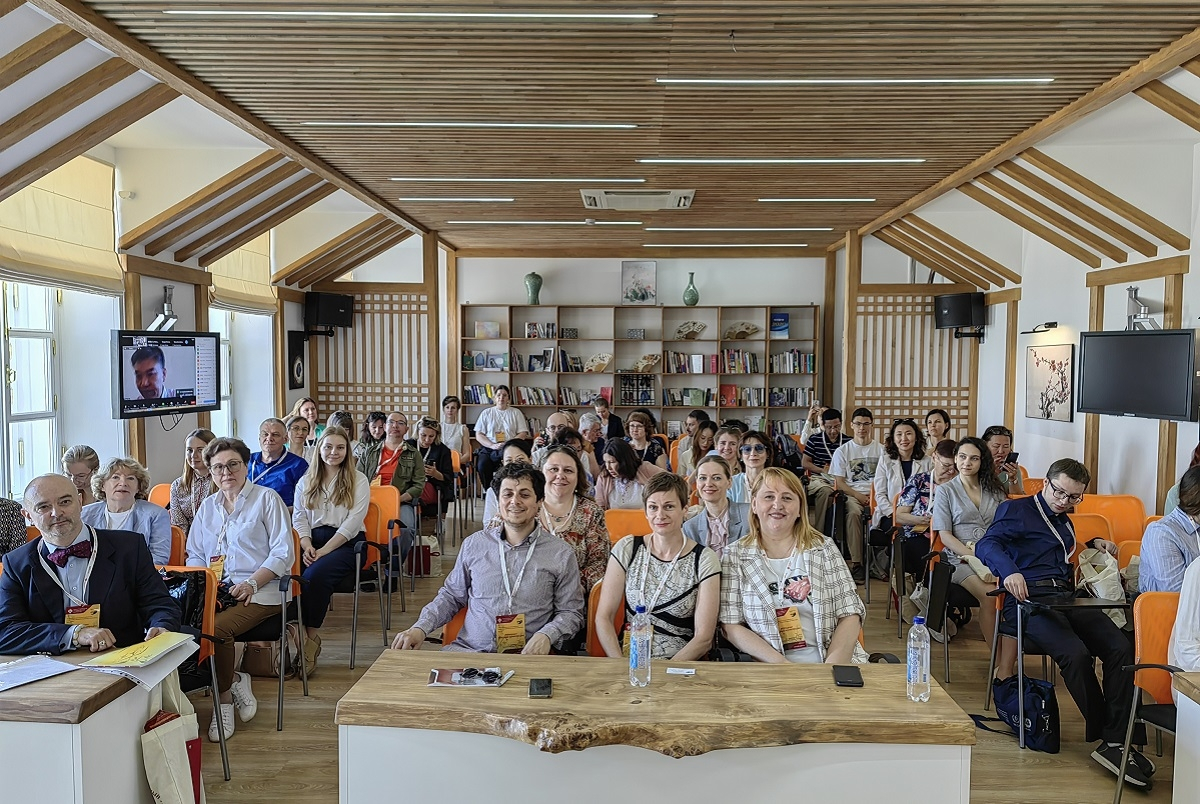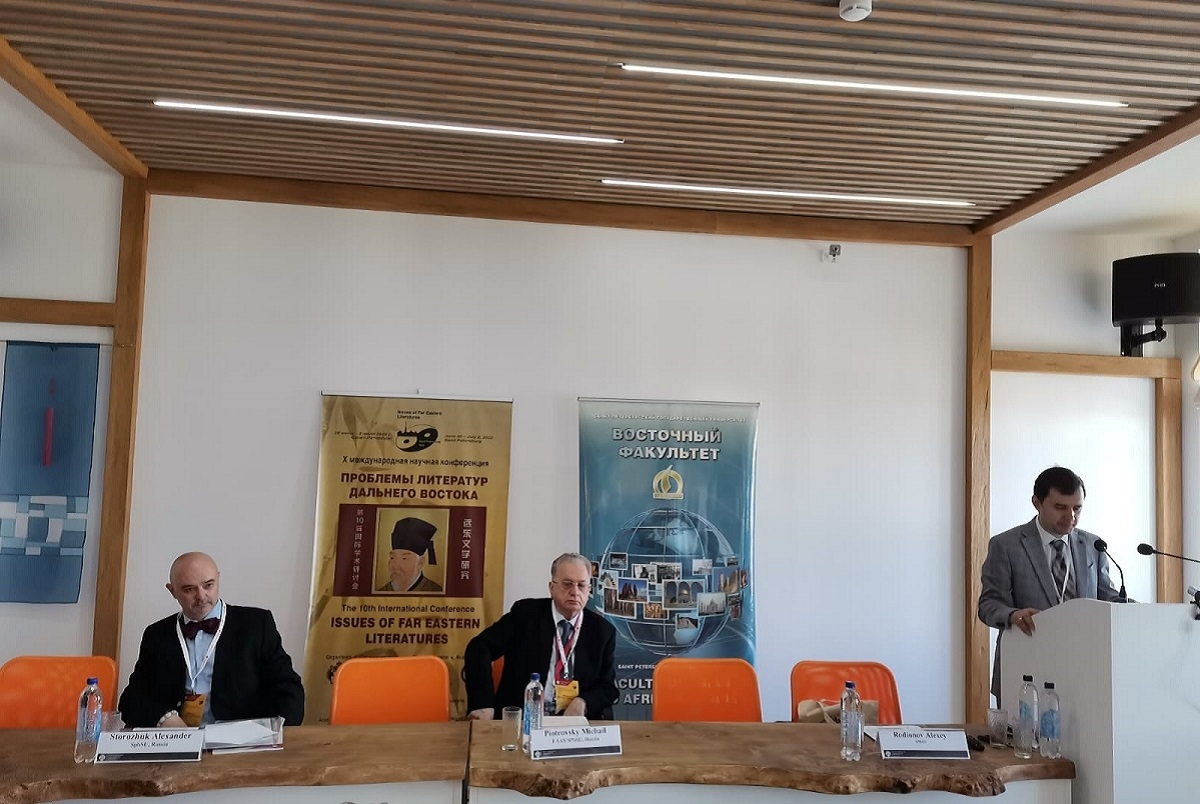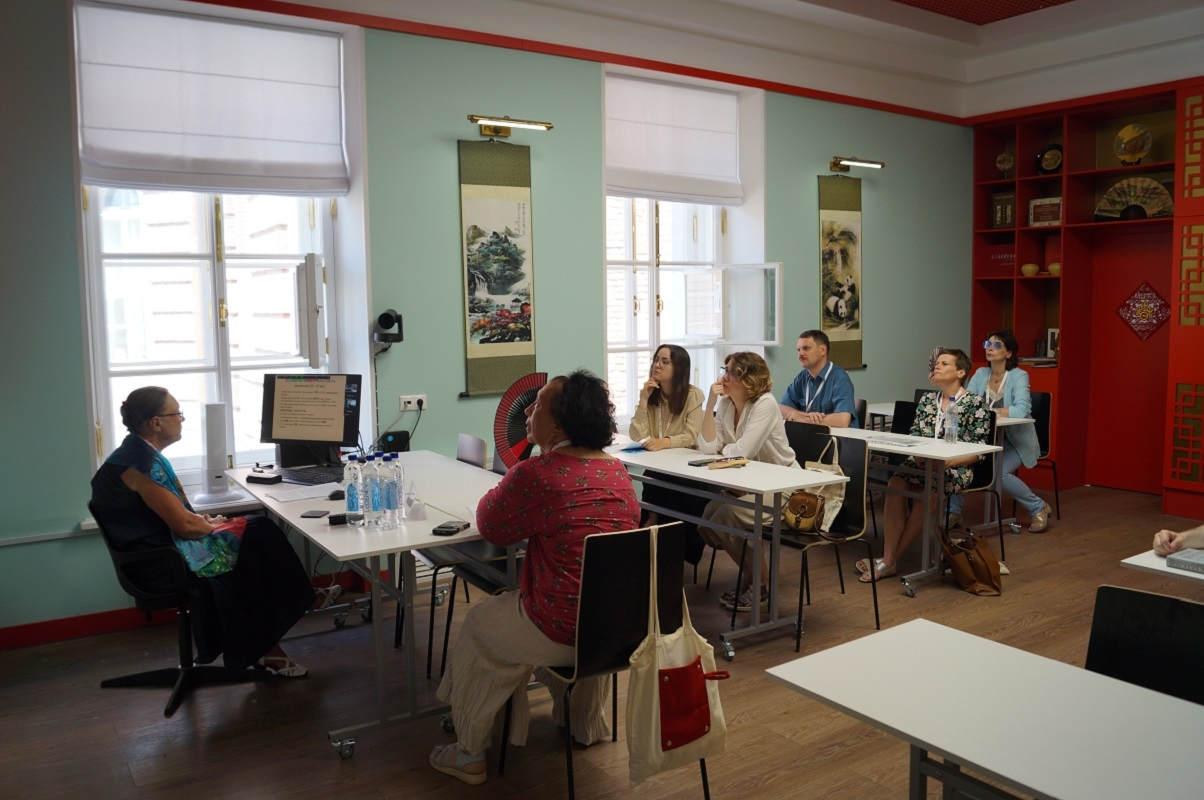"Culture helps us understand each other": issues of Far Eastern literatures discussed at St Petersburg University
The 10th International Research Conference "Issues of Far Eastern Literatures" has been held at St Petersburg University.

The conference was organised by St Petersburg University and Nanjing University — one of the leading universities in China, with the support of the Centre for Language Education and Cooperation under the Ministry of Education of the People’s Republic of China (Confucius Institute Headquarters) and Capital Normal University (Beijing).
The conference was opened by Professor Mikhail Piotrovsky, a Full Member of the Russian Academy of Sciences and the Dean of the Faculty of Asian and African Studies at St Petersburg University. Academician Piotrovsky reminded that the biannual conference "Issues of Far Eastern Literatures" was the initiative of the legendary Russian sinologist, Professor of St Petersburg University Evgenii Serebriakov (1928–2013). This initiative proved to be a great success.
Every two years, we bring together the best scholars of literatures of Far East and South East Asia from across the globe.
Mikhail Piotrovsky, Member of the Russian Academy of Sciences, Dean of the Faculty of Asian and African Studies at St Petersburg University
This year, the research findings were presented by over 120 participants from the leading centres of Oriental studies in: Russia; Belarus; Bulgaria; Germany; Italy; China; the Netherlands; and the Czech Republic.

The 10th Conference "Issues of Far Eastern Literatures" was dedicated to the 1250th anniversary of the renowned Tang poet Bái Jūyì, whose works are included in the golden treasury of Chinese literature. ‘It is important that here in Russia, at St Petersburg University in particular, we have a rich tradition of poetic translations and studying Bái Jūyì’s literary legacy,’ said Mikhail Piotrovsky. ‘In the Russian cultural environment, Bái Jūyì was compared to the Russian poet Nikolay Nekrasov; and prominent Russian composers Georgy Sviridov and Edison Denisov wrote music inspired by his poems.’
According to Academician Piotrovsky, we have begun a new stage in the development of the humanities, including Oriental studies.
We are trying to change the criteria for evaluating research activities. As has been repeatedly pointed out, it is necessary to turn the focus away from the Western citation database system and scientometric approaches that distort the reality of research achievements. It is time that we started assessing the work of an orientalist scholar based on the opinions of the expert community, because only experts understand the true value of the work.
Mikhail Piotrovsky, Member of the Russian Academy of Sciences, Dean of the Faculty of Asian and African Studies at St Petersburg University
In particular, it has been proposed to regard the publication of monographs as highest research accomplishments, and to recognise annotated translations, academic grammars and dictionaries as research outcomes.
The conference work was structured around five thematic panels: "Bái Jūyì and his contribution to Chinese literature"; "New Tasks in the Study of Classical Chinese Literature in the Age of Globalisation and Informatisation"; "The Trends in Chinese Literature of the 20th and 21st centuries"; "Far Eastern Literatures in Russia and Russian Literature in the Far Eastern and South-East Asian Countries: Translation, Perception and Interference"; and "Literatures of Far East and South East Asia: Past and Present".

Alexey Rodionov, Senior Deputy Dean of the Faculty of Asian and African Studies and Associate Professor in the Department of Chinese Philology at St Petersburg University, noted that the conference was supported by the diplomatic mission of the People’s Republic of China in Russia. Ms Liǔ Ruò Méi, the cultural attaché at the Consulate General of the People’s Republic of China in St Petersburg and Professor of Beijing Foreign Studies University, delivered the greetings of the Consul General of the People’s Republic of China in St Petersburg Ms Wáng Wén Lì.
Bái Jūyì is still very much loved in his homeland. His poetry is appreciated for its unembellished style and realism. Bái Jūyì’s his poetry has inspired many well-known Russian orientalists, including the brilliant sinologist Lev Eidlin, who translated Bái Jūyì’s poems, which were later set to music.
Professor Liǔ Ruò Méi, Beijing Foreign Studies University
Professor Liǔ Ruò Méi reminded that this conference had not been the first event dedicated to Bái Jūyì in Russia. ‘This appreciation of the Chinese culture shows that there has been a long-standing friendship between our countries. Despite all the challenges that we are currently experiencing, such events lay the foundations for cooperation and build a bridge of friendship between our countries. It is culture that helps us communicate and understand each other.’
Professor Xú Xìng Wú, Director of the Institute for Advanced Studies in Humanities and Social Sciences at Nanjing University, was in agreement with his colleague: ‘No barriers of space and time, no changes in external situations can prevent the exchange between scholars and scientists, the exchange of ideas.’
Professor Xú Xìng Wú stressed that Bái Jūyì played a monumental role in Chinese poetic history, with his poetic oeuvre being the largest among the poets of his time. Bái Jūyì considered himself a poetry dweller, contemporaries called him the poetic devil, and later critics began to call him the king of poetry. His poems were inscribed on walls and recited by both emperors and commoners at the very bottom of the social ladder.
‘It was his poetic gift, his sensitivity to human sufferings and his ability to convey strong emotions in a style that is simple and easy to understand that won the hearts of the people,’ explained Professor Xú Xìng Wú. ‘At the same time, Bái Jūyì believed that poetry should keep pace with the times and reflect the events of the present. He used his gift to satirise the actions of greedy officials and highlight the sufferings of the common folk. Thus, he became a model for future generations of writers.’

The plenary session was opened by Professor Aleksandr Storozhuk, Head of the Department of Chinese Philology at St Petersburg University. He spoke about the origin of the New Yuèfǔ — a poetic movement for the revival of the old form of Han poetry, mostly folk ballad verses, collected or written by the Music Bureau (Yuèfǔ). Bái Jūyì is considered one of the founders of the New Yuèfǔ group of poets, who often used poetry as a form of political and societal protest. While preparing for the official exams, Bái Jūyì and his friend, the poet Yuán Zhěn, created a collection of poetic texts in 75 sections — "Forest of Stratagems", aimed to offer the emperor an insight into contemporary politics.
Met with complete indifference, the collection is unlikely to have reached the emperor. For us, the descendants, however, this work is of particular interest because in this work, the themes of the New Yuèfǔ poetry were laid in the form of a well-thought-out and detailed set of socio-philosophical premises. The main goal of the New Yuèfǔ movement was to revive the true social role of poetry. The New Yuèfǔ poetry was popular among contemporaries and had a significant impact on the later life of the authors, and on the development of poetry and social thought.
Professor Aleksandr Storozhuk, Head of the Department of Chinese Philology at St Petersburg University
Professor Liú Chóngxǐ from Nanjing University spoke about Bái Jūyì’s texts found in stone inscriptions. The poet lived during the Tang dynasty, when, as one of his contemporaries wrote, ‘stone was perceived as a friend, admired for its wisdom, kept like precious jasper and loved like one’s own child.’
From the provinces, where he was exiled or sent to work, Bái Jūyì would bring unusual rocks, regardless of the costs. He called them his friends and revelled in contemplating them. ‘This is a question of the aesthetics of the time,’ explained Professor Liú Chóngxǐ. ‘Bái Jūyì was a petrophile, rocks were his passion, which was, indeed, in tune with his reclusion. The rocks were a reflection of his inner self. On the other hand, he used stone imagery in his poetry.’
According to Professor Liú Chóngxǐ, rocks became part of the linguistic landscape of Bái Jūyì’s poetry, having a special social significance.
‘There are some transformations of perception,’ emphasised Professor Liú Chóngxǐ. ‘The poet looks at material rocks as an artist, and his poetry is charged with spiritual meaning through their symbolism. These rocks provide the particular cultural context to his work.’
Dr Hristina Teodosieva and Dr Antonia Tsankova, philologists from Sofia University St Kliment Ohridski (Bulgaria, Sofia), spoke about the reception of Bái Jūyì’s prose in Bulgaria 1250 years after his birth. A survey conducted among young people in Bulgaria showed that a text written by a Chinese author almost 1200 years ago yields a meaning directly useful to modern readers. ‘Our respondents found similarities between Bái Jūyì’s texts and the works of the classics of Bulgarian literature. They discovered ideas familiar to them from their native culture, such as the sense of tranquillity and unity with nature.’ Parallels with the poem ‘Near the Rila Monastery’ by Ivan Vazov, who was the first of the Bulgarian classics to make nature his protagonist, were most often noted. ‘Over 8,000 kilometres away from Bulgaria, over 1200 years later, and yet, we can feel the emotional experience that the writer was attempting to create for the reader,’ Dr Teodosieva and Dr Tsankova underlined. ‘The search for one’s place in this world through the contemplation of the mountain landscape is perfectly comprehensible and the modern reader can easily find the meanings and messages of the text.’

